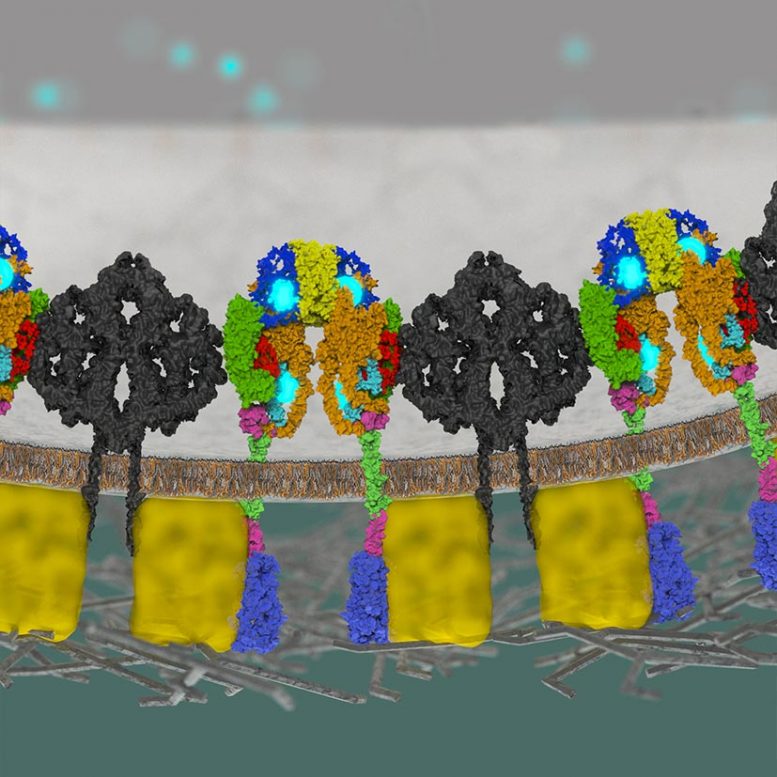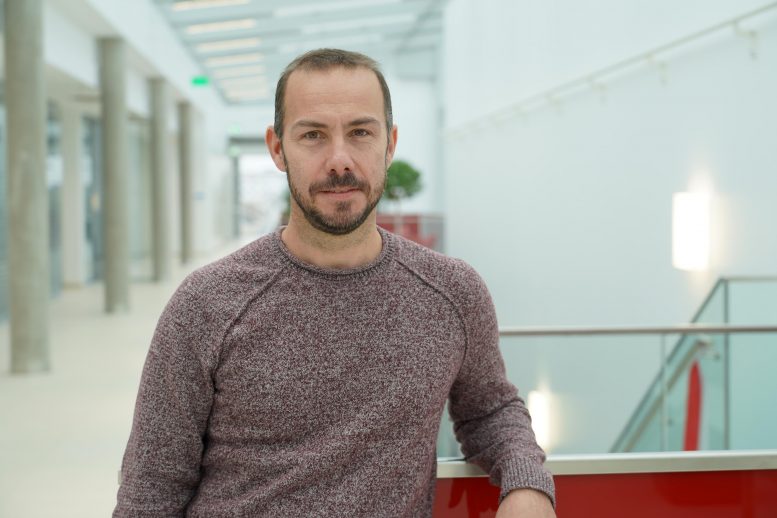
Posted on 01/29/2021 12:38:19 PM PST by Red Badger

Model of insulin inhibitory receptor ‘inceptor’ (in black) desensetizing the insulin recptor (in color) on a pancreatic beta cell. Insulin in blue. Credit: Helmholtz Zentrum München
========================================================
Researchers have discovered a novel and druggable insulin inhibitory receptor, named inceptor. The latest study from Helmholtz Zentrum Muenchen, the Technical University of Munich, and the German Center for Diabetes Research is a significant milestone for diabetes research as the scientific community celebrates 100 years of insulin and 50 years of insulin receptor discovery. The blocking of inceptor function leads to an increased sensitization of the insulin signaling pathway in pancreatic beta cells. This might allow protection and regeneration of beta cells for diabetes remission.
Diabetes mellitus is a complex disease characterized by the loss or dysfunction of insulin-producing beta cells in the islets of Langerhans, a specialist “micro-organ” in the pancreas that controls systemic blood sugar levels. Diabetes complications, such as chronic high blood sugar, systemic metabolic failure and, in the long-term, multi-organ damage, create enormous medical and social burdens and leads to premature death. Currently no pharmacological treatment can stop or reverse disease progression. Previous studies have demonstrated that intensive insulin therapy has the potential for improved blood sugar control and diabetes remission but also leads to unintended weight gain and even more severe side effects, such as an increased risk of deep drop in blood sugar causing unawareness.
Heiko Lickert’s research focuses on the development of regenerative approaches to treat diabetes complementary and alternative to the classical immunological and metabolic therapies. “Insulin resistance in pancreatic beta cells causes diabetes. Therapies that sensitize those cells to insulin may protect patients with diabetes against beta cell loss and failure,” says Lickert. With the discovery of the insulin inhibitory receptor, his research group has found a promising molecular target for beta cell protection and regeneration therapy that does not carry the unintended side effects of intensive insulin therapy.

Heiko Lickert. Credit: Helmholtz Zentrum Muenchen
In experiments with mice, the researchers showed that the function of inceptor is to shield the insulin-producing beta cells from constitutive insulin pathway activation. Remarkably, inceptor is upregulated in diabetes and by blocking insulin signaling it might contribute to insulin resistance.
What happens if the function of inceptor is inhibited genetically or pharmacologically? The group explored this question by knocking out inceptor in beta cells and by blocking its function using monoclonal antibodies. “The result was exactly what we were hoping for: Insulin signaling and the functional beta cell mass was increased. This makes inceptor a very promising target to treat the root cause of diabetes, the loss and dysfunction of beta cells,” says Ansarullah, one of the first-authors of the study published in Nature and diabetes researcher at Helmholtz Zentrum München.
“Frederick Banting noted already in his Nobel Prize lecture for the discovery of the life-saving drug insulin a hundred years ago that ‘Insulin is not a cure for diabetes, but a treatment of the symptoms’. This has not changed in the last century. Our goal for future research is to leverage on the discovery of inceptor and develop drugs for beta cell regeneration. This could be beneficial for patients with type 1 and 2 diabetes and ultimately lead to diabetes remission,” states Lickert.
“A hundred years ago, the discovery of insulin has transformed a deadly illness into a manageable disease. Our discovery of the insulin inhibitory receptor now is another important step to finally get rid of the disease,” says Matthias Tschöp, CEO at Helmholtz Zentrum München. “While the COVID-19 pandemic represents an immediate threat we will overcome, we must not forget that diabetes remains one of the biggest and fastest-growing killers on our planet. With a series of recent breakthroughs, now including the discovery of inceptor, our Helmholtz Diabetes Center is doubling down on its mission that is a world without diabetes.”
Reference: “Inceptor counteracts insulin signalling in β-cells to control glycaemic” by Ansarullah, Chirag Jain, Fataneh Fathi Far, Sarah Homberg, Katharina Wißmiller, Felizitas Gräfin von Hahn, Aurelia Raducanu, Silvia Schirge, Michael Sterr, Sara Bilekova, Johanna Siehler, Julius Wiener, Lena Oppenländer, Amir Morshedi, Aimée Bastidas-Ponce, Gustav Collden, Martin Irmler, Johannes Beckers, Annette Feuchtinger, Michal Grzybek, Christin Ahlbrecht, Regina Feederle, Oliver Plettenburg, Timo D. Müller, Matthias Meier, Matthias H. Tschöp, Ünal Coskun and Heiko Lickert, 27 January 2021, Nature. DOI: 10.1038/s41586-021-03225-8
*Heiko Lickert is Director of the Institute of Diabetes and Regeneration Research at Helmholtz Zentrum Muenchen, Professor and Chair of Beta Cell Biology at the Technical University of Munich and member of the German Center for Diabetes Research.
You can make your blood sugar level too low.
Been there. Done that. It’s very distressing, as you start having to wolf down stuff to get the blood sugar up!
I was warned about it and carry a sugar drink when exerting myself but never actually hit it.
Toronto scientists cure disease in mice, December 15, 2006. Tom Blackwell, National Post In a discovery that has stunned even those behind it, scientists at a Toronto hospital say they have proof the body's nervous system helps trigger diabetes, opening the door to a potential near-cure of the disease that affects millions of Canadians.
Diabetic mice became healthy virtually overnight after researchers injected a substance to counteract the effect of malfunctioning pain neurons in the pancreas. "I couldn't believe it," said Dr. Michael Salter, a pain expert at the Hospital for Sick Children and one of the scientists. "Mice with diabetes suddenly didn't have diabetes any more."
The researchers caution they have yet to confirm their findings in people, but say they expect results from human studies within a year or so. Any treatment that may emerge to help at least some patients would likely be years away from hitting the market. But the excitement of the team from Sick Kids, whose work is being published today in the journal Cell, is almost palpable. "I've never seen anything like it," said Dr. Hans Michael Dosch, an immunologist at the hospital and a leader of the studies. "In my career, this is unique."
Their conclusions upset conventional wisdom that Type 1 diabetes, the most serious form of the illness that typically first appears in childhood, was solely caused by auto-immune responses -- the body's immune system turning on itself. They also conclude that there are far more similarities than previously thought between Type 1 and Type 2 diabetes, and that nerves likely play a role in other chronic inflammatory conditions, such as asthma and Crohn's disease.
The "paradigm-changing" study opens "a novel, exciting door to address one of the diseases with large societal impact," said Dr. Christian Stohler, a leading U.S. pain specialist and dean of dentistry at the University of Maryland, who has reviewed the work. "The treatment and diagnosis of neuropathic diseases is poised to take a dramatic leap forward because of the impressive research."
About two million Canadians suffer from diabetes, 10% of them with Type 1, contributing to 41,000 deaths a year. Insulin replacement therapy is the only treatment of Type 1, and cannot prevent many of the side effects, from heart attacks to kidney failure.
In Type 1 diabetes, the pancreas does not produce enough insulin to shift glucose into the cells that need it. In Type 2 diabetes, the insulin that is produced is not used effectively -- something called insulin resistance -- also resulting in poor absorption of glucose. The problems stem partly from inflammation -- and eventual death -- of insulin-producing islet cells in the pancreas.
Dr. Dosch had concluded in a 1999 paper that there were surprising similarities between diabetes and multiple sclerosis, a central nervous system disease. His interest was also piqued by the presence around the insulin-producing islets of an "enormous" number of nerves, pain neurons primarily used to signal the brain that tissue has been damaged.
Suspecting a link between the nerves and diabetes, he and Dr. Salter used an old experimental trick -- injecting capsaicin, the active ingredient in hot chili peppers, to kill the pancreatic sensory nerves in mice that had an equivalent of Type 1 diabetes. "Then we had the biggest shock of our lives," Dr. Dosch said. Almost immediately, the islets began producing insulin normally "It was a shock ? really out of left field, because nothing in the literature was saying anything about this."
It turns out the nerves secrete neuropeptides that are instrumental in the proper functioning of the islets. Further study by the team, which also involved the University of Calgary and the Jackson Laboratory in Maine, found that the nerves in diabetic mice were releasing too little of the neuropeptides, resulting in a "vicious cycle" of stress on the islets.
So next they injected the neuropeptide "substance P" in the pancreases of diabetic mice, a demanding task given the tiny size of the rodent organs. The results were dramatic. The islet inflammation cleared up and the diabetes was gone. Some have remained in that state for as long as four months, with just one injection.
They also discovered that their treatments curbed the insulin resistance that is the hallmark of Type 2 diabetes, and that insulin resistance is a major factor in Type 1 diabetes, suggesting the two illnesses are quite similar. While pain scientists have been receptive to the research, immunologists have voiced skepticism at the idea of the nervous system playing such a major role in the disease. Editors of Cell put the Toronto researchers through vigorous review to prove the validity of their conclusions, though an editorial in the publication gives a positive review of the work. "It will no doubt cause a great deal of consternation," said Dr. Salter about his paper.
The researchers are now setting out to confirm that the connection between sensory nerves and diabetes holds true in humans. If it does, they will see if their treatments have the same effects on people as they did on mice. Nothing is for sure, but "there is a great deal of promise," Dr. Salter said.
I had some dextrose tablets handy. Had to use them quick!
I guess was lucky my cat woke me up before I went into a coma or something.
She likes to wake me up every night, trying to be fed early. I keep telling her no food until after 6AM but she insists on waking me up around 4:30 or 5. It was a good thing this time. I might have gone from sleep to coma.
A coma for three days is certain death without water.
More ‘carrots’. Gotta keep the sheep excited and the money coming in.
Life ain’t easy for a boy named Heiko Lickert.
Disclaimer: Opinions posted on Free Republic are those of the individual posters and do not necessarily represent the opinion of Free Republic or its management. All materials posted herein are protected by copyright law and the exemption for fair use of copyrighted works.